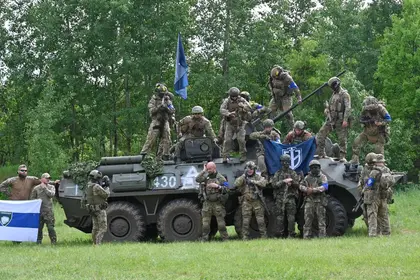Neither Russian President Vladimir Putin, nor his under-pressure commanding general in Ukraine, Valery Gerasimov, likely saw this coming. They have been narrowly focused on the battle for Bakhmut and the defense of Crimea. Rear area security – a habitual failure since the beginning of Putin’s ‘special military operation’– must have just moved up on their list of critical elements to address.
On May 22, elements of the pro-Ukrainian, self-styled Russian Volunteer Corps and the Freedom of Russia Legion, composed solely of anti-Putin Russian citizens, used the most essential of the principles of war – surprise, and combined it with speed to achieve an effect that has shaken the confidence of many Russians. According to the Institute for the Study of War (ISW), several Russian sources claimed they advanced and captured “the settlements of Glotovo and Gora Podol – approximately 3km and 5km from the Ukrainian border, respectively.”
Like a hot knife cutting through butter, unimpeded success likely surprised the rebel raiders as much as the Russian defenders caught off-guard . According to Oryx, they captured a BTR-82A armored personnel carrier, and destroyed a 100mm T-12 anti-tank gun and two Ural-4320 trucks.
But this was not solely a ‘mission impossible’ type operation; rather, it was also a planned raid designed to create confusion in the Russian rear area and to relieve pressure from Bakhmut. If so, it achieved its objective, and then some, similar to the probing and armed reconnaissance missions conducted in Bakhmut just two weeks ago. As George Barros, a Russia analyst with ISW commented, “If these Russian volunteers indeed penetrated as deep as they claim to have, then it demonstrates that Russian field fortifications don't really mean anything if they're not sufficiently manned.”

Moscow Prime Suspect for Sabotage Aimed at Disrupting Olympic Games
Was the raid a prelude to the counteroffensive? Maybe, given its success in Belgorod. And that has the Kremlin worried. They will need to reposition forces to shore up their border posts along their lengthy border with Ukraine – if not Belarus as well.
The raid into Belgorod probably exceeded all expectations. According to Retired-Army Lieutenant General and former Commander of US Army Europe, Mark Hertling, the raid “surprised Russian border guards and the defense ministry, scared local Russian citizens, sent a message to Putin, achieved greater distance with few casualties, and caused the relocation of Russian forces.” But it also served an intelligence purpose – exposing the 3rd Motorized Rifle Division (20th Guards Combined Arms Army, Western Military District) that responded to the incursion, along with other Russian formations in staging areas on the Russian side of the border.
Equally as important, the raid further exposed a deepening and critical vulnerability – a badly demoralized Russian army at its wits end. 28 Russian soldiers from assault platoons assigned to the 110th Brigade surrendered to Ukraine’s 59th Motor Rifle Brigade in Avdiiyka on May 21. In a video made after their surrender, the commander complains about a lack of provisions, their weapons, the lack of ammunition and fire support, and then accused the Russian command of “sending them to sure death.”
As Putin’s leaning tower of Jenga teeters ever closer to collapse, Russian propagandists like Olga Skabeyeva are beginning to lodge reservations about the war’s outcome as newly trained soldiers and US and NATO provided weapon systems begin to take their place on the battlefield. During a recent show, Skabeyeva challenged an overly optimistic guest by asking “could there be fighters? And tanks? What about HIMARS? What about long-range artillery? And Storm Shadow? Everything seems impossible, and an attack on Belgorod also seemed impossible the day before yesterday.”
When you factor in the drone that struck the flagpole atop the Kremlin days before the May 9 Victory Day Parade, Zelensky and his generals are making the impossible possible – from shooting down Kh-47M2 Kinzhal missiles to launching cross-border raids. Slowly, confidence in Putin and his ‘special military operation’ is eroding – in the foxholes and in the homes of ordinary Russian citizens.
So is Russian faith in Putin’s Wunderwaffe weapon systems. Those hypersonic Kinzhal missiles? Turns out they might not have been so hypersonic after all. Chalk up yet one more failed Russian weapons system to go along with the T-14 Armata tank, Suppression and Destruction of Enemy Air Defenses (SEAD/DEAD) system failures that likely led to the recent downing of an Su-34 and Su-35 as well as two Mi-8 helicopters, and outdated and outmoded secure communications equipment.
Combined, the erosion of the average Russian soldier’s confidence is becoming contagious and is leading to fear. Like Ukrainian golden sunflower seeds being planted against the backdrop of a crisp blue Spring sky, seeds of doubt are being planted deep into the Russian’s psyche be it in Moscow, border staging areas or in Bakhmut and Crimea.
The brilliance of Belgorod was in the daring. Daring to bravely challenge the Western-imposed rules of the war. Daring to audaciously deny Putin and his generals any sanctuary. Daring to win at all costs. Zelensky and his generals are masterfully keeping Gerasimov and the Kremlin off-balance, while seeking out an array of new Russian weaknesses to exploit alongside strategic and tactical targets to interdict.
Russia’s day of reckoning is coming and will soon arrive. When it does, the smoldering fires of Bakhmut and Ukraine’s heroic defense thereof, will be fully atoned for because of the critical time the ‘City of Wine and Roses’ gave Kyiv to prepare for its long anticipated counter offensive.
The views expressed in this opinion article are the author’s and not necessarily those of Kyiv Post.
Copyright 2023. Jonathan E. Sweet and Mark C. Toth. All rights reserved.
You can also highlight the text and press Ctrl + Enter






